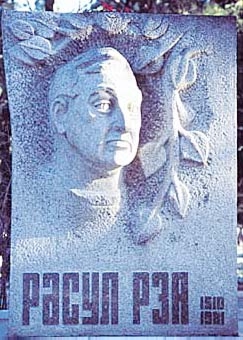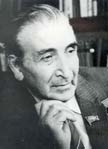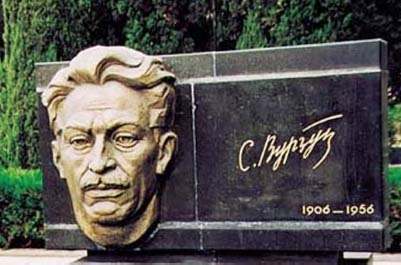|

Spring
2000 (8.1)
Pages
55-57
Writers Speak
out on Azeri
In 1939,
Stalin ordered Azerbaijan and all nations of Turkic-related languages
to adopt Cyrillic as their standard alphabet. At the time, Azerbaijan
was using a modified Latin script, which they had officially
adopted a few years earlier in 1923 after centuries of using
the Arabic script. Stalin was concerned that the Latin alphabet
could become a unifying force for the Muslim Turkic nations.
As his decision was imposed during the height of Stalinist Repression
when tens of thousands of ordinary citizens were being arrested,
shot or sent to Siberian labor camp, no one dared protest his
ultimatum.
But a few intellectuals in Azerbaijan did try to divert attention
from the alphabet to the Azeri language itself, hoping that no
matter what set of symbols was dictated, that the language itself
would survive intact. They were especially concerned that introducing
Russian letters that were irrelevant to the Azeri sound system
would eventually result in changes to the inherent nature of
Azeri itself. Nevertheless, four characters were introduced and
there was no way to get them officially removed until 1958 -
five years after Stalin died.
Here, some of Azerbaijan's intellectuals urge caution in regard
to anything that might lead to structural changes to the language
itself.
_____
  Rasul Reza Rasul Reza
The person who does not know his own mother tongue well will
not be able to master other languages either.
The fate of our language cannot be sealed by a few individuals.
The greatest protectorate of our language is the people themselves,
the speech and history of the nation. Let not publishers and
printers rush out to create a great single Communist language
of the future.
As the saying goes: "Let them not roll up their sleeves
before crossing the river. Let them not feel the warmth before
the arrival of summer." Let them not litter our language
with their ignorance.
Let me remind you of an Azerbaijani expression: "Sit down
and be more heavy" (Be more serious and don't talk nonsense).
Rasul Reza, President of the Azerbaijan Writers' Union,
addressing a session of the Supreme Soviet of Azerbaijan SSR
in 1939. Soon afterwards he lost his job and was sent off to
fight in World War II.
Fortunately, Reza survived, unlike nearly 400,000 other Azerbaijanis
who died.
(Translated by Marjan Abadi).
Vagif Samadoghlu
God,
In what language do you want me to pray to you?
Is one prayer enough for you?
Or shall I implore you several times for a favor?
I'm laughing neither at you nor the world.
I'm laughing at myself.
Because I know only two
Of the thousands of languages that you have created.
And one of those two languages that I know
Is known neither in heaven nor on earth.
That's why I am praying to you
In the only other language that I know:
'God, help me, God'
(Gospodi, pomogi, Gospodi - in Russian).
***
Paths are long,
Paths are short -
Does it make any difference
In what country,
Or on what path you lose your way?
Thousands of countries,
Thousands of languages -
Does it make any difference
In what country,
Or in what language
You keep your silence?
1982
(translated by Aynur Hajiyeva)
  Mirza Ibrahimov Mirza Ibrahimov
Mirza Ibrahimov, People's Writer of Azerbaijan, served as Chairman
of the Supreme Soviet in Azerbaijan in 1954. He felt very strongly
about that nothing was more natural than the desire of a nation
to conduct its official work in its native language. He believed
such was the legal right of every nation in the Soviet Union
and that everyone had to respect this right. With incredible
effort, he eventually succeeded in getting Azeri recognized as
a State language.
At the time, not everyone in Azerbaijan knew Azeri which resulted
in a lot of confusion, delay and miscommunication. Often telegrams
written in Azeri wouldn't reach their intended recipients, mail
from villages would be returned, and government applications
would be processed incorrectly, or not at all.
Ibrahimov pushed hard to make Azerbaijan a second official language,
in addition to Russian. He went to Moscow to speak to the Chairman
of the USSR Supreme Soviet, who agreed with him, convinced that
the idea made sense.
In 1956, the Azerbaijan Communist Party Central Committee amended
Azerbaijan's Constitution to include: (1) Azerbaijani is the
State language of the Azerbaijan Republic, and (2) National minorities
living in Azerbaijan shall be guaranteed the right to develop
independently and use their national language in their cultural
as well as state organizations.
Some approved; most didn't and local authorities were not prepared
to enforce the law. After all, people had just lived through
the Stalinist era. Khrushchev had just come to power. It wasn't
long before Ibrahimov was removed from his position. Family members
insist it was because of his persistent position about the Azeri
language.
In 1957 Ibrahimov went on to publish the book "The Azerbaijani
Language" that set forth his ideas. In 1959, at a plenary
session of the Central Committee of the Azerbaijan Communist
Party, Ibrahimov blasted the Republic's leadership for not implementing
the new law about the Azeri language. A bitter debate ensued.
Ibrahimov was criticized for trying to weaken the people's desire
to learn Russian. Others said that adopting a law wouldn't change
anything. Someone even suggested that Ibrahimov should be sent
to a village to "learn the peasant life."
One of the most controversial sections of his book stated that
"language is not only created by writers and journalists
but by the entire nation. Therefore, the entire nation should
know it, especially scholars, university teachers, top authorities,
Party and Soviet leaders. Not only should they know it but they
should know it well. Not only is it their duty as a citizen,
but it is their responsibility which arises from their position."
Ibrahimov concluded that there were enormous gaps between life
as it was and life as it should be.
Ibrahimov's point was eventually proven. In 1995, Azerbaijan's
new Constitution as an independent State designated Azeri as
the only official State language. Slowly, a perceptible shift
in attitudes toward the Azeri language is taking place. Gradually,
Azeri is gaining the status that Ibrahimov dreamed of nearly
half a century ago.
Much of the
information for this article was taken from the article "After
30 Years," written by Alexandre Grich in 1986.
  Samad Vurghun Samad Vurghun
Samad Vurghun was reverred as one of Azerbaijan's most beloved
poets. Despite how much he did not want to adopt for the Cyrillic
alphabet, he had no choice but to embrace the concept and to
persuade others to do the same. Notice how he advocates for the
integrity of the Azeri language despite the restrictions that
Soviets were imposing via the Cyrillic alphabet .
_____
The issue that we have gathered to discuss today is a very serious
and complicated one. As such, it is necessary that we follow
the advice of linguists and professors. Nevertheless, I would
like to express my own opinion.
You well know that the old Arabic alphabet stood like a stone
wall in front of the beautiful and cultural language of the Azerbaijani
people for many long years. By banning the use of this alphabet,
the Azerbaijani people made a great stride forward in its history.
Some of the other nations of the Soviet Union went on to follow
our example.
But today as we are talking about creating a new alphabet, some
of our friends don't understand the real issues, and they explain
this by saying that the modern Azerbaijani alphabet is reactionary.
This is not right. The reason why we are converting to a new
alphabet is not because the Latin script is bad, it's because
the Russian alphabet is more productive and better.
Azerbaijani people are proud of being the first among Oriental
nations that buried the Arabic alphabet and adopted the Latin
alphabet. This event is written in golden letters of our history.
We say: "Comrade Latin Alphabet, we are your friends. You
came to our house like a new moon, but now the sun with its powerful
rays has come to our house. So, don't be offended by us."
At least, that's my opinion.
After the October Revolution, Cyrillic which was the alphabet
of the most progressive and advanced nation became the alphabet
of a number of Soviet nations. And that's why Azerbaijanis now
consider it necessary to accept a new alphabet based on that
script.
But in order that the Azerbaijani people can benefit from it,
this new alphabet must both reflect the subtlety, beauty and
national traits of the Azerbaijani language and must further
stimulate its future progress and development.
There is no need to say how rich and cultural our language is.
We know that Azerbaijani language stands on the level together
with the languages of advanced countries of the world. It is
a language whose written literature has a millennium of history.
And that's why we must try to build up our alphabet as an advanced
and cultural alphabet.
What are the prerequisites necessary for a new alphabet to advance?
I think that the first prerequisite is to reduce the number of
symbols as much as possible. If we can maintain 32 letters in
our new alphabet, if we can meet the demands of our language
with these, then it can be considered that we have accomplished
our duty with honor. I think we have to be very greedy about
the number of letters. This is not the greediness of Haji Gara
[a character in one of Akhundov's plays]. This is for the sake
of our language alone. From this point of view I want to say
a few words about the Cyrcillic letters [which represent the
sounds] ts, yu, ya, soft sh, soft sign and hard sign. These letters
cannot be included into Azerbaijan's alphabet simply because
they have no corresponding sounds in our language.
We have to protect the musical characteristics and harmony of
our language. The point is not whether to include "ts"
in our alphabet or not, the point is that Azerbaijani language
has its own national traits. Including such letters in our alphabet
can somewhat alter the harmony of our language though they sound
good and beautiful in the Russian language.
Some friends support the idea of adopting certain letters simply
for the sake of foreign words in our language. But history shows
that as each nation derives words from foreign languages, it
subordinates them to its own phonetic sound system.
It surprises me greatly that some people demand to bring the
"soft sign" into our language. I don't think it is
necessary to do that. Because there is no such sound inherent
to the Azerbaijani language. The soft ending of words in our
language is not determined by the last letter of the word, but
rather by the letter that precedes the last one so there is no
need to use this letter that represents the "soft sign".
The second necessary prerequisite for our alphabet is to guard
it from "dots and tails". This was one of the disadvantages
of the Arabic alphabet. Fuzuli wrote with such great skill of
the agony brought on by a forgetful and careless secretary who
forgot to put in all the "dots and tails". And for
this reason alone, we must protect ourselves from "dots
and tails" forever. . . .
There are letters in our alphabet like "h,  , ,
 , and , and  ,"
which need to be preserved either by keeping the letters of the
current Azerbaijani alphabet or by creating new signs that can
fully correspond with the colorfulness and richness of our language.
These letters don't need to be replaced by Cyrillic or distorted. ,"
which need to be preserved either by keeping the letters of the
current Azerbaijani alphabet or by creating new signs that can
fully correspond with the colorfulness and richness of our language.
These letters don't need to be replaced by Cyrillic or distorted.
The creation of a new Azerbaijani alphabet on the basis of the
Cyrillic script will create a bridge for our nation to learn
Russian and also for other brother nations to learn the Azerbaijani
language. The political and cultural significance of this task
exists in this fact.
So, we must begin this work emulating the Bolshevik pattern of
courage and creation. Only in this way can we create a scientifically
based, rich and cultural alphabet for the Azerbaijani nation.
From Azerbaijan
International
(8.1) Spring 2000.
© Azerbaijan International 2000. All rights reserved.
Back to Index AI 8.1 (Spring
2000)
AI Home |
Magazine
Choice
| Topics
| Store
| Contact
us
|